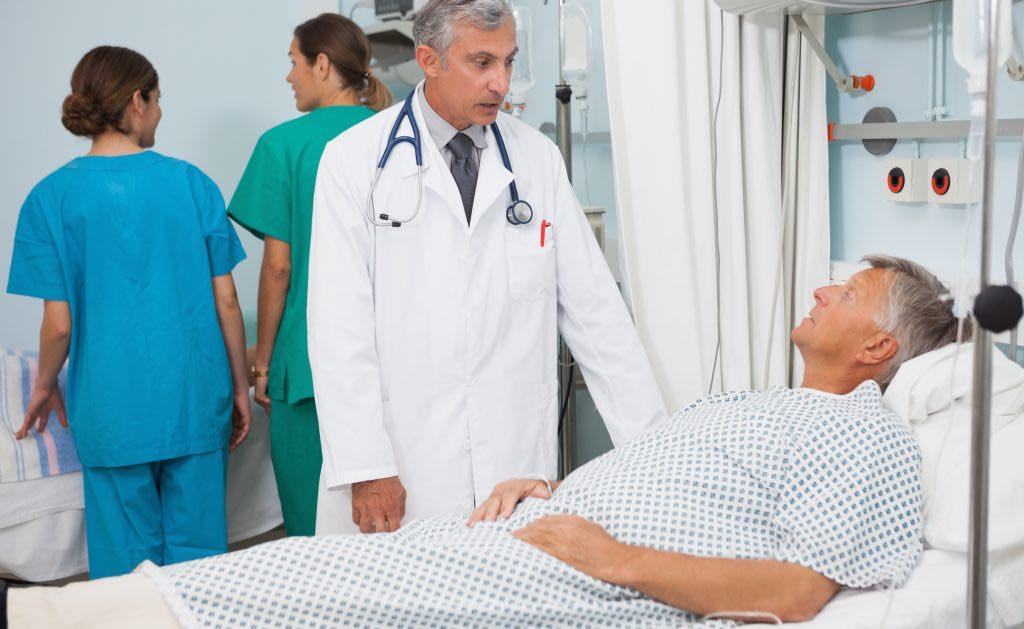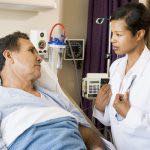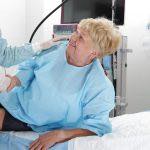Around the time you turn 50 years old, having a colonoscopy becomes a routine procedure that is performed annually. But why exactly do you need a colonoscopy and what happens during the procedure? A colonoscopy exam allows your doctor to see the inside of your large intestine and rectum to check for colon polyps and detect colon cancer. Your physician may recommend a colonoscopy diet to prepare you for your procedure.
During a colonoscopy, you’ll be sedated and shouldn’t feel any discomfort. Your physician will then insert a long, flexible, tubular instrument with a tiny camera called a colonoscope through your rectum and into your large intestine. The colonoscope transmits images of your colon lining which are then displayed on a screen while your procedure is happening.
If necessary, polyps or other abnormal tissue observed can be removed through the scope for further testing. You may feel mild cramping during the procedure. Once the procedure is over and your physician has the information needed, the colonoscope is withdrawn while the lining of your bowel is examined.
Did you know? Colon and rectal cancers are the third most common type of cancer in men and in women and the second leading cause of cancer-related deaths in the United States.
What should you eat before a colonoscopy?
While the colonoscopy itself typically only takes 30 to 60 minutes to complete, you’ll need to follow the colonoscopy prep instructions given to you by your doctor in the days leading up to the exam.
In order for your physician to clearly see your colon during the procedure, it’s recommended to follow a colonoscopy prep diet to help decrease the amount of food residue during your procedure. This means changing to a low-fiber, low-residue diet for the five days leading up to your colonoscopy. Low-residue food refers to food that is easily digested. Eating less whole-grain bread and cereal, nuts, seeds, raw or dried fruits, and vegetables helps to clear your colon of residue and ease symptoms like diarrhea, bloating, gas, and cramping.
While your physician will provide clear instructions based on your circumstances, the following tips will give you an idea of what to expect during the week prior to your colonoscopy.
The colonoscopy diet: what to eat five days before your colonoscopy
Approximately five days prior to your colonoscopy, start eating a low-fiber diet. This means cutting out whole grains, raw vegetables, nuts, seeds, dried and raw fruit. You’ll also want to eliminate foods that are hard to digest like fried foods, tough meats like steak, popcorn, and vegetable skins.
During this time, it’s also imperative that you read food labels. Foods like yogurt, ice cream, and cereal may have added fiber that you don’t expect which can make them harder to purge. Unfortunately, when foods aren’t properly digested, they can get in the way of the camera during your colonoscopy. This could cause inaccuracies in the test.
While the five days prior to your colonoscopy may seem very restrictive, you’re still able to eat white bread, eggs, lean meat, pasta, tofu, smooth peanut butter, and well-cooked, skinless vegetables.
When preparing your food, try poaching, stewing, or steaming as much as possible. Roasting and grilling can dry out food which then makes it harder to digest. If you’re craving fruits, substitute raw with fruits that are canned, cooked, or pureed.
Reminder: drink extra fluids during this part of your colonoscopy prep diet to avoid constipation.
The colonoscopy diet: what to eat leading up to your colonoscopy
While it’s not 100% necessary, switching over to soft foods two days prior to the colonoscopy will make your cleansing process easier. Fortunately, there are plenty of great-tasting foods you can still enjoy including smoothies, soft fruits, vegetable soups, and scrambled eggs.
The Colon Cancer Alliance recommends the following sample menu for the days leading up to your colonoscopy:
Breakfast: Greek yogurt with bananas and honey on top
Lunch: Omelet with a side of sliced honeydew
Dinner: Vegetable broth with steamed veggies
Dessert: Jello or gelatin without added fruit or red or purple dye
The colonoscopy diet: what to eat in the 24 hours before your colonoscopy
The most crucial time leading up to your colonoscopy is the 24 hours before it happens. During this time, your doctor will place you on a clear liquid-only diet. This will allow your body to purge the remainder of the waste remaining inside of your colon. While this part of the preparation can be difficult for some, you can still intake:
- Water—While you’re spending a lot of time focusing on foods during your colonoscopy preparations, it’s imperative to keep drinking water. It’s easy to become dehydrated when your body is purging itself of so much waste.
- Soda—Here’s a trick, carbonated beverages can actually trick your body into feeling full.
- Jello and clear broth—Tip: first eat cold Jello and then follow it with hot broth. The warm broth will expand the gelatin in your stomach and make you feel full.
- Clear apple and grape juices
- Tea
During this time, you shouldn’t have any alcohol, even it’s it’s clear. You should also avoid any milk products. Ask your doctor whether you should discontinue any prescription and over-the-counter medications in the days prior to your procedure.
The colonoscopy diet: what to eat the night before your colonoscopy
In the twelve hours leading up to your colonoscopy, you will only be able to drink a strong laxative prescribed by your doctor to clear out any remaining waste from your colon. Some doctors recommend splitting the laxative—taking half the night before your exam and the other half six hours before your exam. If your colonoscopy is scheduled first thing in the morning, you will have to finish the entire laxative before midnight. No food is allowed during these twelve hours.
While prepping for your colonoscopy may be uncomfortable, it’s important to do it right. This is the best way to make sure that your procedure can be done accurately in order to diagnose any potential problems.
The colonoscopy diet: what to eat the day after your colonoscopy
Colonoscopies are typically performed in outpatient facilities, so you’ll be able to leave soon after your procedure. Since you’ll be sedated during the colonoscopy procedure, a friend or family member will need to take you home afterward. You shouldn’t plan on driving for at least 8 hours.
Once at home, you’ll still want to watch what you eat. Rehydrating after days of purging is extremely important—be sure to drink fluids and electrolytes during your colonoscopy recovery. For the next 24 hours, drink a lot and eat soft foods that won’t irritate your stomach, including:
- Applesauce
- Scrambled eggs
- Yogurt
- Jello
- Popsicles
- Mashed or baked potato
You’ll want to avoid the following foods and drinks for the 24 hours following your colonoscopy:
- Alcohol
- Hard-to-digest meat
- Raw vegetables
- Corn
- Fried food
- Nuts
If you feel up to it after a day, you can safely eat your regular diet again.
Finding a fair price for your colonoscopy
The national average for a colonoscopy is $2,750. If you’re worried about affording the high cost of a colonoscopy, New Choice Health’s Colonoscopy Assistance program may be right for you. Patient Assist works with a select group of doctors and facilities to provide high-quality medical care at affordable prices. Use New Choice Health’s Patient Assist program to save money on your colonoscopy today.







